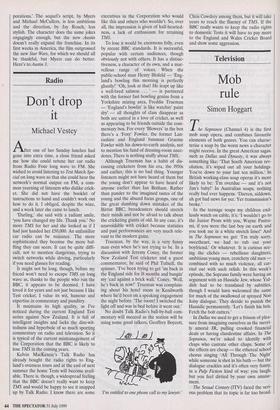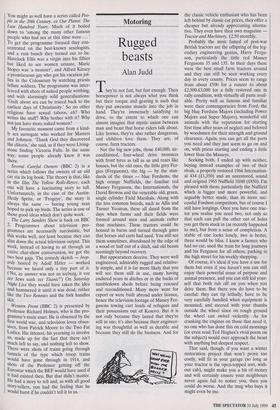Television
Mob rule
Simon Hoggart
The Sopranos (Channel 4) is the first mob soap opera, and combines favourite elements of both genres. You can charac- terise a soap by the worst news a character might receive. In the great American sagas, such as Dallas and Dynasty, it was always something like: 'That South American rev- olution, it's wiped out all your holdings. You're down to your last ten million.' In British working-class soap operas it's more likely to be: 'I'm overdue — and it's not Jim's baby!' In Australian soaps, nothing really bad ever happens. 'Darren, siddown, ah got bad news for yer. Yer transmission's broke.'
In the teenage soaps my children end- lessly watch on cable, it's: 'I wouldn't go to the Junior Prom with you, Wayne Pastra- mi, if you were the last boy on earth and you took me in a white stretch limo!' And in The Sopranos we get: 'I'm truly sorry, sweetheart, we had to rub out your boyfriend.' Or whatever. It is curious see- ing the clichés — rebellious daughters, ambitious young men, crotchety old men combined with so much violence, all car- ried out with such relish. In this week's episode, the Soprano family were having an argument with an Hassidic Jew, whose Yid- dish had to be translated by subtitles, though I would have welcomed the same for much of the swallowed or sprayed Noo Joisy dialogue. They decide to punish the Hassidic permanently. 'Let's finish his bris. Fetch the bolt cutters.'
In Dallas we used to get a frisson of plea- sure from imagining ourselves as the merri- ly amoral JR, pulling crooked financial deals or having clandestine affairs. In The Sopranos, we're asked to identify with chaps who castrate other chaps. Some of the effects are cheap — the ethereal school chorus singing 'All Through The Night' while someone is shot in his bath — but the dialogue crackles and it's often very funny, in a Pulp Fiction kind of way: you laugh, but you feel dirtied by your own amuse- ment.
The Sexual Century (ITV) faced the seri- ous problem that its topic is far too broad. You might as well have a series called Peo- ple in the 20th Century, or Our Planet: The Last Hundred Years. Much of it boiled down to 'among the many other famous people who had sex at this time were ... ' To get the programme focused they con- centrated on the best-known sexologists, and a rum bunch they turned out to be. Havelock Ellis was a virgin into his fifties but liked to see women urinate, Marie Stopes was 'a monster', and Alfred Kinsey a promiscuous gay who got his vacation jol- lies in the Colosseum by watching priests fellate soldiers. The programme was inter- leaved with shots of naked people writhing, and with alarmingly wild generalisations: `Guilt about sex can be traced back to the earliest days of Christianity.' So no other religions have sexual taboos, eh? Who writes the stuff? Why bother with it? Why not just have more naked women?
My favourite moment came from a kind- ly sex surrogate who worked for Masters and Johnson. 'Thank God they discovered the clitoris,'.she said, as if they were Living- stone finding Victoria Falls. In the same way, some people already knew it was there.
Several Careful Owners (BBC 2) is a series which follows the owners of an old car via its log book. The theory is that, like in the film The Yellow Rolls-Royce, each one will have a fascinating story to tell. Unfortunately, in the case of the Austin- Healy Sprite, or 'Frogeye', the story is always the same — boring young man hoped to pick up birds. The series is one of those good ideas which don't quite work.
The Larry Sanders Show is back on BBC 2. Programmes about television pro- grammes are necessarily narcissistic, but this works well, not least because they can slim down the actual television output. This week, instead of having to sit through an entire chat-show conversation, we got the two best gags. The comedy sketch — Jeop- ardy hosted by Adolf Hitler — worked because we heard only a tiny part of it. (No, ze answer was not an iceberg, it voz zer Jews sunk zer Titanic!') On Saturday Night Live they would have taken the idea and hammered it until it was dead, rather like the Two Ronnies and the fork handles skit.
Western Front (BBC 2) is presented by Professor Richard Holmes, who is the pro- gramme's main asset. He is obsessed by the first world war, and television loves obses- sives, from Patrick Moore to the Two Fat Ladies. His interest, his yearning to involve us, made up for the fact that there isn't much left to say, and nothing left to show. There were shots of trains going through tunnels of the type which troop trains would have gone through in 1914, and shots of the Professor getting off the Eurostar which the BEF would have used if it had existed then. But that didn't matter. He had a story to tell and, as with all good story-tellers, you had the feeling that he would burst if be couldn't tell it to us.



























































 Previous page
Previous page